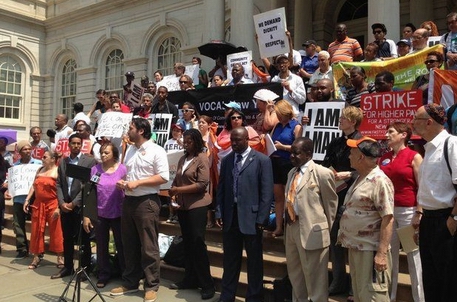
It's hard enough to live on $7.25 an hour -- but struggling fast food workers told members of the City Council they often make even less due to "wage theft" from employers who don't pay overtime or unfairly dock people's paychecks.
"We struggle earning such low wages at work," Naquasia Legrand of Canarsie told the Civil Service and Labor Committee during a hearing Thursday. "I had to decide whether to eat or to get a MetroCard to get to work, or pay my cell phone bill or get to work."
The hearing followed a rally organized by Fast Food Forward -- an advocacy group fighting for the right of workers at McDonald's, Burger King, Papa John's, Taco Bell, Pizza Hut, KFC, Wendy's and Domino's to unionize -- and to earn $15 an hour.
Last month, the New York Times reported that the state was launching a formal investigation into practices by the fast food industry -- including failing to pay overtime, paying less than the minimum wage, failing to reimburse employees for expenses, and doctoring time sheets.
On average, fast food workers earn between $10,000 and $18,000 a year -- and 80 percent reported their pay being "stolen" in some way, including being forced to pay for work expenses that brought their wages below the minimum.
Ms. Legrand works at two KFC restaurants, nearly two hours apart from each other in Brooklyn and Queens, and earns $7.70 an hour at one restaurant and $8 at the other. But she recalled instances of being made to wait an hour before clocking in.
"In the past I had worked over 40 hours and I didn't get paid for it," she said.
Other workers said they were employed at more than one franchise, but by the same owner -- and their hours would be split across separate paychecks to avoid overtime.
Ms. Legrand -- and several people who testified -- said they had to rely on food stamps, even though they didn't want to, to pay the bills.
"Without food stamps I don't put food on the table, because the money I make is to pay bills," Gregroy Reynoso said. "We're not asking to be rich -- we're asking to live."
Joseph Berrera, 23, has to live with his uncle to get by -- and said he won't accept food stamps, even though his job at KFC pays little each week.
"I don't want to depend on public assistance," he said. "I want to work and I want to earn and I want to get a fair wage so I can survive in the city I live in."
Even staying with a company for a long time doesn't offer relief. Rosa Grullon has worked for McDonald's for 21 years -- 15 as a manager -- and still earns just $10.75 an hour.
"I don't have no money for my daughter to go to college, because $10.75 is no money," she said.
Okeon Joseph works at Burger King to help finance his community college education in computer information technology -- but he started in high school, to help support his family, and was put on the night shift. Working until 3 a.m. caused his grades to suffer, and pushed back his graduation by a year and a half. The restaurant doesn't provide pay stubs promptly, he said, making it hard to be sure he's getting paid for all his worked hours.
But Councilman Vincent Ignizio (R-South Shore) said after the hearings that nobody is forcing people to work at fast food chains for those wages. Employers, he said, will offer the wages they think they can afford.
"Employees have to make the decision about whether they're going to work for that wage or not," he said.
The wages may prompt some fast food employees to find other options, like learning a trade, for higher paid, more skilled work.
But matters of employers not paying overtime when they are legally required to is different, Ignizio said, and those instances should be investigated.
"Where there are legitimate issues relating to a violation of the law, that should be pursued," Ignizio said.
During the hearing, Councilwoman Melissa Mark-Viverito offered a different point of view from Ignizio's.
"We've got to do a shift in the paradigm of how we treat workers," Ms. Mark-Viverito said, "and respect workers and respect what you do every day."
Councilwoman Leticia James suggested any franchise owner found to be cheating workers should never receive any public subsidy -- often give to big projects like malls or developments that might house a fast food restaurant.





